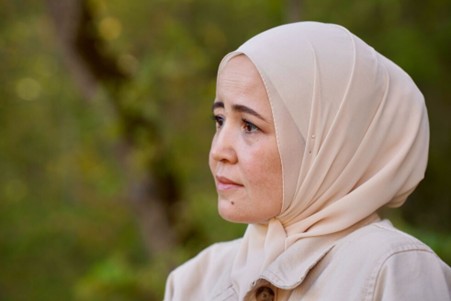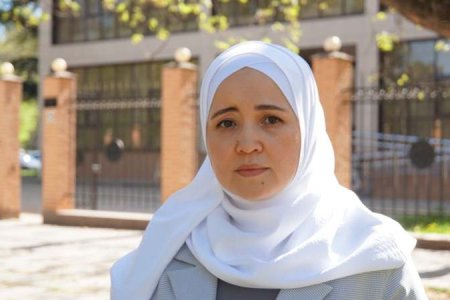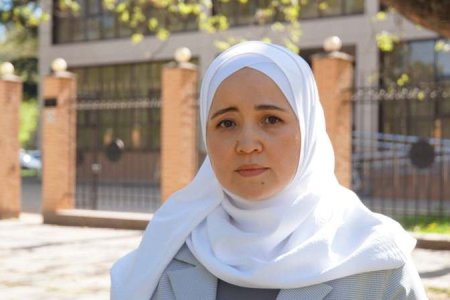
Occupation police turned up at the home of Lutfiye Zudiyeva on 18 October to formally ‘warn’ the renowned Crimean Tatar journalist and human rights defender of possible administrative and criminal charges. Although the list of laws she could be accused of violating was longer than usual, this is by no means the first such ‘warning’ she has received. Usually, however, the warnings are based on imminent anniversaries, and are delivered to a number of prominent Crimean Tatars. Here Lutfiye appears to have been the only recipient, and the significant ‘date’ can only have been the day last week that Russia crossed another red line and came for four Crimean Tatar women – the wife of a political prisoner, and three very young women.
The two officers who appeared on Saturday morning were from the occupation ‘Dzhankoi police’ and were just doing what they were told, they said when asked why they had come. Lutfiye noted in writing on the ‘police’ copy of this document that she objected to the warning and had no intention of violating current legislation.
In the past, such warnings, issued, for example, on the eve of the anniversary of the 1944 Deportation of the entire Crimean Tatar people from their homeland, have suggested that honouring the victims of a crime, recognized in Ukraine as an act of genocide, constitutes “extremist activities”.
Here, Lutfiye was, indeed, ‘warned’ against violating Russia’s law on countering so-called ‘extremist activities’, but also against infringing the law on ‘gatherings, rallies, processions and pickets’, all of which Russia has virtually prohibited on occupied territory, except where they promote the aggressor state. She was warned that the “leader or organizer of mass events bears liability’ for observance of regulations and for preventing and / or stopping ‘extremist activities’.
In practice, Russia has treated any presence of Crimean Tatars outside ‘courts’ where politically motivated detention hearings are taking place, etc. as ‘rallies’, detained and prosecuted those who were simply standing there in solidarity. It is likely to be just as arbitrary whom they designate as the “leader” or “organizer”.
The human rights defender was also ‘warned’ against infringements of other norms, including one of the draconian new norms rushed into law after Russia’s full-scale invasion of Ukraine, namely that on actions supposed aimed at ‘discrediting Russia’s army, etc’ (Article 20.3.3 of Russia’s code of administrative offences).
Even more worrying is the formidable list of criminal charges with which Lutfiye is threatened. This does not just include the charge of having supposedly ‘organized mass riots’ (Article 212 of Russia’s criminal code), but also that of having infringed the procedure for holding meetings several times (Article 212.1). What this means in effect is that a person can face criminal charges and a prison sentence for three or more administrative prosecutions which regularly result in convictions, fines and / or brief terms of imprisonment without any actual infringement needed. She is also threatened with liability under one of Russia’s most cynical norms, introduced shortly after its invasion and annexation of Crimea. Article 280.1 punishes for something claimed to be “public calls to action aimed at violating the Russian Federation’s territorial integrity”, although used against people who, in keeping with international law, refer to Crimea as Ukrainian territory.
The message is profoundly menacing, especially in the light of the events last week. In the early hours of 15 October, armed Russian FSB and other enforcement officers burst into several Crimean Tatar homes, with their target, for the first time, women. Four women have now been remanded in custody and are facing near certain sentences of up to 20 years without any crime.
Russia launched its conveyor-belt ‘trials’ on fictitious ‘terrorism’ charges based solely on unproven allegations of involvement in the peaceful transnational Hizb ut-Tahrir Muslim organization back in 2015 and swiftly turned to using them as a weapon against civic journalists and activists from the Crimean Solidarity human rights movement, Hizb ut-Tahrir is legal in Ukraine, and Russia’s supreme court never provided any explanation for its highly secretive ruling in 2003, claiming the organization to be ‘terrorist’.
Up till 15 October 2025, Russia had imprisoned a huge number of Crimean Solidarity journalists and activists, but had targeted men. On Wednesday, it came for Esma Nimetulayeva (b. 1985), the wife of political prisoner Remzi Nimetulayev and the mother of their five children. They also arrested three very young Crimean Tatar women: Elviza Alieva (b. 2005); Fevziye Osmanova (b. 2004); and Nasiba Saidova (b. 2006). Esma Nimetulayeva is now facing the more serious charge of ‘organizing’ a supposed Hizb ut-Tahrir group under Article 205.5 § 1 of Russia’s criminal code, with this currently leading to sentences of 17-20 years’ imprisonment. The three younger women are accused of ‘involvement’ in such a fictitious ‘group’ (Article 205.5 § 2), with the sentences from 12 to 16 years. In occupied Crimea, Russia also adds an extra, preposterous, charge of ‘planning to violently seize power’, under Article 278 (more details here)
Russia was doubtless aware that it had crossed a red line with its targeting of women as it showed unusual restraint on 16 October, outside the occupation ‘Kievsky district court’ in Simferopol where the women were remanded in custody for (an initial period of) two months. Not one of the relatives, friends and members of the Crimean Tatar community waiting outside was detained, with mass detentions having become the Russian norm in occupied Crimea over recent years.
On that same day a delegation of around 70 Crimean Tatar men gathered outside the so-called Spiritual Directorate of Muslims of Crimea which, under mufti Emirali Ablayev, has been collaborating with the Russian occupation regime since 2014. They spoke with the occupation ‘deputy head of the Crimean government’ Albert Kurshutov and deputy mufti Rayim Gafarov, with not one member of the delegation detained.
It is unclear whether such restraint was so unheard of that the FSB felt the need to terrorise Lutfiye Zudiyeva, or whether this extra act of menacing intimidation and pressure was always intended.
Lutfiye has been covering the human rights situation in Crimea for many years, and her courage and unwillingness to be silenced is evidently a source of great irritation. She has come under increasing attack, with the latest being her forced inclusion on Russia’s notorious list of foreign agents, and first (administration) prosecution for alleged infringement of the onerous rules applied to so-called ‘foreign agents’. It was clear from that latter prosecution that the reason for her persecution was her unwavering courage and her journalist work, telling the truth about repression in Crimea.
Russia has begun targeting women as part of its systematic persecution of all those courageous lawyers, journalists and human rights activists who speak out against repression in occupied Crimea. Silence from the international community will help only Russia, while placing them in still greater danger.



